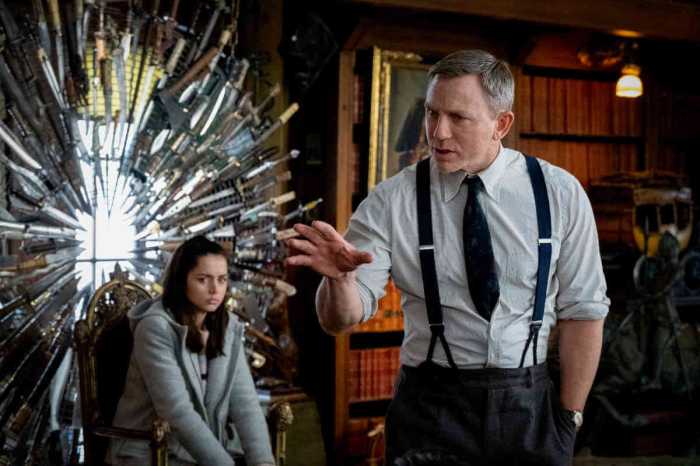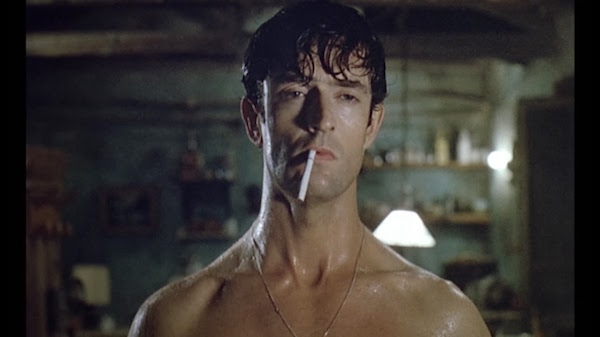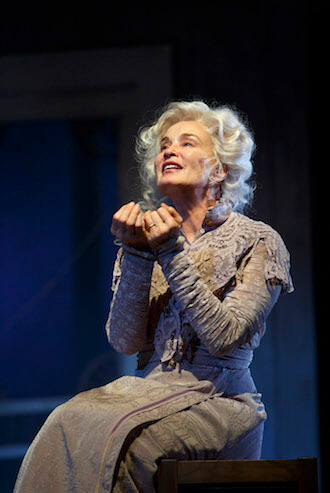Milly Shapiro and Alex Wolff in Ari Aster’s feature debut “Hereditary,” which opens citywide on June 8. | REID CHAVIS/ COURTESY OF A24
Director Ari Aster’s feature debut “Hereditary” is no ordinary horror film. Alas, it’s neither fish nor fowl: stumbling as successful genre fare while masquerading as the family drama it purports to be. Containing two funerals and opening with a title card announcing an elderly woman’s passing, it wears its fascination with death on its sleeve. Only one scene depicts violence, but that’s not its concern at all.
Instead, “Hereditary” is obsessed with the effects of grief on the family around which it centers, especially the mother, Annie (Toni Collette). The very talented Gabriel Byrne, who plays her husband Steve, is given comparatively little to do, while Annie’s calmest scenes suggest she’s struggling to contain a panic attack. And Annie’s rarely able to restrain herself: “Hereditary” embraces full-on melodrama to a degree that’s unusual for a horror film. But it’s emotionally vacant, closer in spirit to the repressed daze of Annie and Steve’s teenage son Peter (Alex Wolff), who spends the film’s first half semi-deliberately numbing himself.
“Hereditary” opens with the emotional consequences of Graham family matriarch Ellen’s death on her surviving family. Psychiatrist Steve (Byrne played the same occupation to much better effect on the TV series “In Treatment”) struggles to keep things together, as Annie seems about to fall apart at every moment. Peter is a heavy pothead, while his younger sister Charlie (Milly Shapiro) sees hallucinatory images outside when not tagging along with him. The latter leads to tragedy when he takes her to a party. After he inhales a huge bong hit, she tells him that her throat feels uncomfortable; forced to drive her home stoned, he winds up in an accident that kills her. This makes the family’s depression even worse, which is not helped by Annie’s occult consultations with her neighbor Joan (Ann Dowd.)
Ari Aster’s “Hereditary” fails to get its pitch right
Elements of Aster’s approach evoke influences as seemingly incompatible as John Cassavetes, William Friedkin, and Kiyoshi Kurosawa. Aster uses quite a few camera set-ups straight out of the “master shot school” that’s developed in East Asian cinema over the past 25 years, but unlike directors such as Tsai Ming-liang and Hou Hsiao-hsien he’s very reticent to let the viewer keep their gaze on an image. “Hereditary” is full of ostentatious camera swirls, as Aster seems to want the audience to know just how stylish his direction is. This leads to shots as absurd as an upside-down image of Annie walking through a hallway, taken from a camera placed on the ceiling.
Aster’s use of music is clearly inspired by Friedkin’s “The Exorcist.” At the time, that film was innovative in eschewing a conventional score for selections of dissonant avant-garde classical music whose noise quotient enhanced its tension. In the press kit, Aster praises the score’s composer, Colin Stetson, saying, “There’s something deeply sinister about Colin’s horns… he’s doing amazing things with circular breathing, multiphonics, and percussive valve-work.” And indeed, it’s possible that it would make a rewarding listen in another context. But as a soundtrack for these images, it just goes for loud stabs of aural shock separated by drones, which Aster deploys wall-to-wall over his film in pale imitation of Friedkin’s embrace of composers like George Crumb and Krzysztof Penderecki.
Colette has received much praise for her performance, but to me she comes across as though she wishes she were Dorothy Malone in a Douglas Sirk film. The two younger actors are actually far more impressive. Although Charlie gets killed off relatively quickly, Shapiro, who looks younger than her 14 years, sells the character’s introduction of the film’s paranormal elements. After all, children tend to live in a world where magical thinking prevails and the boundaries between fantasy and reality are much thinner than in adult life. But this fact also brings a degree of ambiguity to her visions of ghostly figures.
Peter is clearly feeling something he can’t openly express (or doesn’t want to), and this is more challenging for an actor to bring out than the screaming and endless emoting Colette engages in. Wolff portrays a potent kind of interior chill in “Hereditary.”
In the film’s second half, it fully embraces its paranormal elements, and without giving away the ending I can say “Hereditary” winds up in a place very far from its relatively prosaic early scenes. Its trippy turn at first feels refreshing, then goofy: the fatalism and sense of doom underpinning the film are very hard to take as seriously and literally as the film intends us to. “Hereditary” falls flat, more an exploitation of grief and domestic anxiety than a true exploration of them.
HEREDITARY | Directed by Ari Aster | A24 | Opens Jun. 8 | Citywide



































